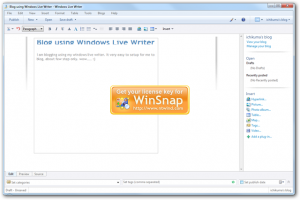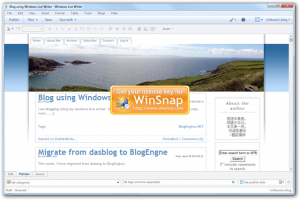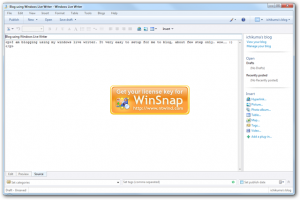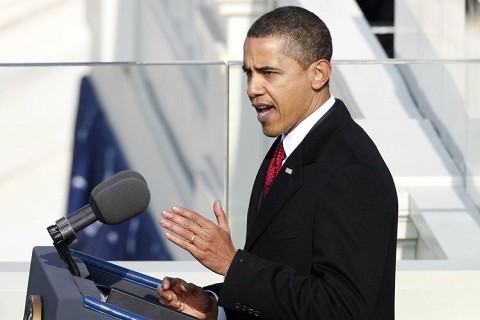求知若飢,虛心若愚。(Stay Hungry. Stay Foolish.)
分享給軒軒和娃娃,求學或處事要“求知若飢,虛心若愚”。(Stay Hungry. Stay Foolish.)
“你得找出你愛的” — Steve Jobs
以下是蘋果電腦公司與Pixar動畫製作室執行長Steve Jobs在2005年6月12日對全體史丹佛大學畢業生的演講內容。
今天,有榮幸來到各位從世界上最好的學校之一畢業的畢業典禮上。我從來沒從大學畢業 。說實話,這是我離大學畢業最近的一刻。今天,我只說三個故事,不談大道理,三個故事就好。
第一個故事,是關於人生中的點點滴滴怎麼串連在一起。
我在里德學院(Reed college)待了六個月就辦休學了。到我退學前,一共休學了十八個月。那麼,我為什麼休學? 這得從我出生前講起。
我的親生母親當時是個研究生,年輕未婚媽媽,她決定讓別人收養我。她強烈覺得應該讓有大學畢業的人收養我,所以我出生時,她就準備讓我被一對律師 夫婦收養。但是這對夫妻到了最後一刻反悔了,他們想收養女孩。所以在等待收養名單上的一對夫妻,我的養父母,在一天半夜裡接到一通電話,問他們「有一名意外出生的男孩,你們要認養他嗎?」而他們的回答是「當然要」。後來,我的生母發現,我現在的媽媽從來沒有大學畢業,我現在的爸爸則連高中畢業也沒有。她拒絕在認養文件上做最後簽字 。直到幾個月後,我的養父母同意將來一定會讓我上大學,她才軟化態度。
十七年後,我上大學了。但是當時我無知選了一所學費幾乎跟史丹佛一樣貴的大學,我那工人階級的父母所有積蓄都花在我的學費上。六個月後,我看不出唸這個書的價值何在。那時候,我不知道這輩子要幹什麼,也不知道唸大學能對我有什麼幫助,而且我為了唸這個書,花光了我父母這輩子的所有積蓄,所以我決定休學,相信船到橋頭自然直。
當時這個決定看來相當可怕,可是現在看來,那是我這輩子做過最好的決定之一。當我休學之後,我再也不用上我沒興趣的必修課,把時間拿去聽那些我有興趣的課。
這一點也不浪漫。我沒有宿舍,所以我睡在友人家裡的地板上,靠著回收可樂空罐的五先令退費買吃的,每個星期天晚上得走七哩的路繞過大半個鎮去印度教的Hare Krishna神廟吃頓好料。我喜歡Hare Krishna神廟的好料。追尋我的好奇與直覺,我所駐足的大部分事物,後來看來都成了無價之寶。
舉例來說:當時里德學院有著大概是全國最好的書法指導。在整個校園內的每一張海報上,每個抽屜的標籤上,都是美麗的手寫字。因為我休學了,可以不照正常選課程序來,所以我跑去學書法。我學了serif與san serif字體,學到在不同字母組合間變更字間距,學到活版印刷偉大的地方。書法的美好、歷史感與藝術感是科學所無法捕捉的,我覺得那很迷人。
我沒預期過學的這些東西能在我生活中起些什麼實際作用,不過十年後,當我在設計第一台麥金塔時,我想起了當時所學的東西,所以把這些東西都設計進了麥金塔裡,這是第一台能印刷出漂亮東西的電腦。如果我沒沉溺於那樣一門課裡,麥金塔可能就不會有多重字體跟變間距字體了。又因為Windows抄襲了麥金塔的使用方式,如果當年我沒這樣做,大概世界上所有的個人電腦都不會有這些東西,印不出現在我們看到的漂亮的字來了。當然,當我還在大學裡時,不可能把這些點點滴滴預先串在一起,但是這在十年後回顧,就顯得非常清楚。
我再說一次,你不能預先把點點滴滴串在一起;唯有未來回顧時,你才會明白那些點點滴滴是如何串在一起的。所以你得相信,你現在所體會的東西,將來多少會連接在一塊。你得信任某個東西,直覺也好,命運也好,生命也好,或者業力。這種作法從來沒讓我失望,也讓我的人生整個不同起來。
我的第二個故事,有關愛與失去。
我好運-年輕時就發現自己愛做什麼事。我二十歲時,跟Steve Wozniak在我爸媽的車庫裡開始了蘋果電腦的事業。我們拼命工作,蘋果電腦在十年間從一間車庫裡的兩個小夥子擴展成了一家員工超過四千人、市價二十億美金的公司,在那之前一年推出了我們最棒的作品-麥金塔,而我才剛邁入人生的第三十個年頭,然後被炒魷魚。要怎麼讓自己創辦的公司炒自己魷魚?好吧,當蘋果電腦成長後,我請了一個我以為他在經營公司上很有才幹的傢伙來,他在頭幾年也確實幹得不錯。可是我們對未來的願景不同,最後只好分道揚鑣,董事會站在他那邊,炒了我魷魚,公開把我請了出去。曾經是我整個成年生活重心的東西不見了,令我不知所措。
有幾個月,我實在不知道要幹什麼好。我覺得我令企業界的前輩們失望-我把他們交給我的接力棒弄丟了。我見了創辦HP的David Packard跟創辦Intel的Bob Noyce,跟他們說我很抱歉把事情搞砸得很厲害了。我成了公眾的非常負面示範,我甚至想要離開矽谷。但是漸漸的,我發現,我還是喜愛著我做過的事情,在蘋果的日子經歷的事件沒有絲毫改變我愛做的事。我被否定了,可是我還是愛做那些事情,所以我決定從頭來過。當時我沒發現,但是現在看來,被蘋果電腦開除,是我所經歷過最好的事情。成功的沉重被從頭來過的輕鬆所取代,每件事情都不那麼確定,讓我自由進入這輩子最有創意的年代。
接下來五年,我開了一家叫做 NeXT的公司,又開一家叫做Pixar的公司,也跟後來的老婆談起了戀愛。Pixar接著製作了世界上第一部全電腦動畫電影,玩具總動員,現在是世界上最成功的動畫製作公司。然後,蘋果電腦買下了NeXT,我回到了蘋果,我們在NeXT發展的技術成了蘋果電腦後來復興的核心。我也有了個美妙的家庭。
我很確定,如果當年蘋果電腦沒開除我,就不會發生這些事情。這帖藥很苦口,可是我想蘋果電腦這個病人需要這帖藥。有時候,人生會用磚頭打你的頭。不要喪失信心。我確信,我愛我所做的事情,這就是這些年來讓我繼續走下去的唯一理由。你得找出你愛的,工作上是如此,對情人也是如此。你的工作將填滿你的一大塊人生,唯一獲得真正滿足的方法就是做你相信是偉大的工作,而唯一做偉大工作的方法是愛你所做的事。如果你還沒找到這些事,繼續找,別停頓。盡你全心全力,你知道你一定會找到。而且,如同任何偉大的關係,事情只會隨著時間愈來愈好。所以,在你找到之前,繼續找,別停頓。
我的第三個故事,關於死亡。
當我十七歲時,我讀到一則格言,好像是「把每一天都當成生命中的最後一天,你就會輕鬆自在。」這對我影響深遠,在過去33年裡,我每天早上都會照鏡子,自問:「如果今天是此生最後一日,我今天要幹些什麼?」每當我連續太多天都得到一個「沒事做」的答案時,我就知道我必須有所變革了。 提醒自己快死了,是我在人生中下重大決定時,所用過最重要的工具。因為幾乎每件事-所有外界期望、所有名譽、所有對困窘或失敗的恐懼-在面對死亡時,都消失了,只有最重要的東西才會留下。提醒自己快死了,是我所知避免掉入自己有東西要失去了的陷阱裡最好的方法。人生不帶來,死不帶去,沒什麼道理不順心而為。
一年前,我被診斷出癌症。我在早上七點半作斷層掃描,在胰臟清楚出現一個腫瘤,我連胰臟是什麼都不知道。醫生告訴我,那幾乎可以確定是一種不治之症,我大概活不到三到六個月了。醫生建議我回家,好好跟親人們聚一聚,這是醫生對臨終病人的標準建議。那代表你得試著在幾個月內把你將來十年想跟小孩講的話講完。那代表你得把每件事情搞定,家人才會盡量輕鬆。那代表你得跟人說再見了。 我整天想著那個診斷結果,那天晚上做了一次切片,從喉嚨伸入一個內視鏡,從胃進腸子,插了根針進胰臟,取了一些腫瘤細胞出來。我打了鎮靜劑,不醒人事,但是我老婆在場。她後來跟我說,當醫生們用顯微鏡看過那些細胞後,他們都哭了,因為那是非常少見的一種胰臟癌,可以用手術治好。所以我接受了手術,康復了。
這是我最接近死亡的時候,我希望那會繼續是未來幾十年內最接近的一次。經歷此事後,我可以比之前死亡只是抽象概念時要更肯定告訴你們下面這些: 沒有人想死。即使那些想上天堂的人,也想活著上天堂。但是死亡是我們共有的目的地,沒有人逃得過。這是註定的,因為死亡簡直就是生命中最棒的發明,是生命變化的媒介,送走老人們,給新生代留下空間。現在你們是新生代,但是不久的將來,你們也會逐漸變老,被送出人生的舞台。抱歉講得這麼戲劇化,但是這是真的。 你們的時間有限,所以不要浪費時間活在別人的生活裡。不要被信條所惑-盲從信條就是活在別人思考結果裡。不要讓別人的意見淹沒了你內在的心聲。最重要的,擁有跟隨內心與直覺的勇氣,你的內心與直覺多少已經知道你真正想要成為什麼樣的人。任何其他事物都是次要的。
在我年輕時,有本神奇的雜誌叫做 Whole Earth Catalog,當年我們很迷這本雜誌。那是一位住在離這不遠的Menlo Park的Stewart Brand發行的,他把雜誌辦得很有詩意。那是1960年代末期,個人電腦跟桌上出版還沒發明,所有內容都是打字機、剪刀跟拍立得相機做出來的。雜誌內容有點像印在紙上的Google,在Google出現之前35年就有了:理想化,充滿新奇工具與神奇的註記。 Stewart跟他的出版團隊出了好幾期Whole Earth Catalog,然後出了停刊號。當時是1970年代中期,我正是你們現在這個年齡的時候。在停刊號的封底,有張早晨鄉間小路的照片,那種你去爬山時會經過的鄉間小路。在照片下有行小字:求知若飢,虛心若愚。
那是他們親筆寫下的告別訊息,我總是以此自許。當你們畢業,展開新生活,我也以此期許你們。
求知若飢,虛心若愚。
非常謝謝大家。
Stanford Report, June 14, 2005
‘You’ve got to find what you love,’ Jobs says
This is the text of the Commencement address by Steve Jobs, CEO of Apple Computer and of Pixar Animation Studios, delivered on June 12, 2005.
I am honored to be with you today at your commencement from one of the finest universities in the world. I never graduated from college. Truth be told, this is the closest I’ve ever gotten to a college graduation. Today I want to tell you three stories from my life. That’s it. No big deal. Just three stories.
The first story is about connecting the dots.
I dropped out of Reed College after the first 6 months, but then stayed around as a drop-in for another 18 months or so before I really quit. So why did I drop out?
It started before I was born. My biological mother was a young, unwed college graduate student, and she decided to put me up for adoption. She felt very strongly that I should be adopted by college graduates, so everything was all set for me to be adopted at birth by a lawyer and his wife. Except that when I popped out they decided at the last minute that they really wanted a girl. So my parents, who were on a waiting list, got a call in the middle of the night asking: “We have an unexpected baby boy; do you want him?” They said: “Of course.” My biological mother later found out that my mother had never graduated from college and that my father had never graduated from high school. She refused to sign the final adoption papers. She only relented a few months later when my parents promised that I would someday go to college.
And 17 years later I did go to college. But I naively chose a college that was almost as expensive as Stanford, and all of my working-class parents’ savings were being spent on my college tuition. After six months, I couldn’t see the value in it. I had no idea what I wanted to do with my life and no idea how college was going to help me figure it out. And here I was spending all of the money my parents had saved their entire life. So I decided to drop out and trust that it would all work out OK. It was pretty scary at the time, but looking back it was one of the best decisions I ever made. The minute I dropped out I could stop taking the required classes that didn’t interest me, and begin dropping in on the ones that looked interesting.
It wasn’t all romantic. I didn’t have a dorm room, so I slept on the floor in friends’ rooms, I returned coke bottles for the 5¢ deposits to buy food with, and I would walk the 7 miles across town every Sunday night to get one good meal a week at the Hare Krishna temple. I loved it. And much of what I stumbled into by following my curiosity and intuition turned out to be priceless later on. Let me give you one example:
Reed College at that time offered perhaps the best calligraphy instruction in the country. Throughout the campus every poster, every label on every drawer, was beautifully hand calligraphed. Because I had dropped out and didn’t have to take the normal classes, I decided to take a calligraphy class to learn how to do this. I learned about serif and san serif typefaces, about varying the amount of space between different letter combinations, about what makes great typography great. It was beautiful, historical, artistically subtle in a way that science can’t capture, and I found it fascinating.
None of this had even a hope of any practical application in my life. But ten years later, when we were designing the first Macintosh computer, it all came back to me. And we designed it all into the Mac. It was the first computer with beautiful typography. If I had never dropped in on that single course in college, the Mac would have never had multiple typefaces or proportionally spaced fonts. And since Windows just copied the Mac, its likely that no personal computer would have them. If I had never dropped out, I would have never dropped in on this calligraphy class, and personal computers might not have the wonderful typography that they do. Of course it was impossible to connect the dots looking forward when I was in college. But it was very, very clear looking backwards ten years later.
Again, you can’t connect the dots looking forward; you can only connect them looking backwards. So you have to trust that the dots will somehow connect in your future. You have to trust in something — your gut, destiny, life, karma, whatever. This approach has never let me down, and it has made all the difference in my life.
My second story is about love and loss.
I was lucky — I found what I loved to do early in life. Woz and I started Apple in my parents garage when I was 20. We worked hard, and in 10 years Apple had grown from just the two of us in a garage into a $2 billion company with over 4000 employees. We had just released our finest creation — the Macintosh — a year earlier, and I had just turned 30. And then I got fired. How can you get fired from a company you started? Well, as Apple grew we hired someone who I thought was very talented to run the company with me, and for the first year or so things went well. But then our visions of the future began to diverge and eventually we had a falling out. When we did, our Board of Directors sided with him. So at 30 I was out. And very publicly out. What had been the focus of my entire adult life was gone, and it was devastating.
I really didn’t know what to do for a few months. I felt that I had let the previous generation of entrepreneurs down – that I had dropped the baton as it was being passed to me. I met with David Packard and Bob Noyce and tried to apologize for screwing up so badly. I was a very public failure, and I even thought about running away from the valley. But something slowly began to dawn on me — I still loved what I did. The turn of events at Apple had not changed that one bit. I had been rejected, but I was still in love. And so I decided to start over.
I didn’t see it then, but it turned out that getting fired from Apple was the best thing that could have ever happened to me. The heaviness of being successful was replaced by the lightness of being a beginner again, less sure about everything. It freed me to enter one of the most creative periods of my life.
During the next five years, I started a company named NeXT, another company named Pixar, and fell in love with an amazing woman who would become my wife. Pixar went on to create the worlds first computer animated feature film, Toy Story, and is now the most successful animation studio in the world. In a remarkable turn of events, Apple bought NeXT, I returned to Apple, and the technology we developed at NeXT is at the heart of Apple’s current renaissance. And Laurene and I have a wonderful family together.
I’m pretty sure none of this would have happened if I hadn’t been fired from Apple. It was awful tasting medicine, but I guess the patient needed it. Sometimes life hits you in the head with a brick. Don’t lose faith. I’m convinced that the only thing that kept me going was that I loved what I did. You’ve got to find what you love. And that is as true for your work as it is for your lovers. Your work is going to fill a large part of your life, and the only way to be truly satisfied is to do what you believe is great work. And the only way to do great work is to love what you do. If you haven’t found it yet, keep looking. Don’t settle. As with all matters of the heart, you’ll know when you find it. And, like any great relationship, it just gets better and better as the years roll on. So keep looking until you find it. Don’t settle.
My third story is about death.
When I was 17, I read a quote that went something like: “If you live each day as if it was your last, someday you’ll most certainly be right.” It made an impression on me, and since then, for the past 33 years, I have looked in the mirror every morning and asked myself: “If today were the last day of my life, would I want to do what I am about to do today?” And whenever the answer has been “No” for too many days in a row, I know I need to change something.
Remembering that I’ll be dead soon is the most important tool I’ve ever encountered to help me make the big choices in life. Because almost everything — all external expectations, all pride, all fear of embarrassment or failure – these things just fall away in the face of death, leaving only what is truly important. Remembering that you are going to die is the best way I know to avoid the trap of thinking you have something to lose. You are already naked. There is no reason not to follow your heart.
About a year ago I was diagnosed with cancer. I had a scan at 7:30 in the morning, and it clearly showed a tumor on my pancreas. I didn’t even know what a pancreas was. The doctors told me this was almost certainly a type of cancer that is incurable, and that I should expect to live no longer than three to six months. My doctor advised me to go home and get my affairs in order, which is doctor’s code for prepare to die. It means to try to tell your kids everything you thought you’d have the next 10 years to tell them in just a few months. It means to make sure everything is buttoned up so that it will be as easy as possible for your family. It means to say your goodbyes.
I lived with that diagnosis all day. Later that evening I had a biopsy, where they stuck an endoscope down my throat, through my stomach and into my intestines, put a needle into my pancreas and got a few cells from the tumor. I was sedated, but my wife, who was there, told me that when they viewed the cells under a microscope the doctors started crying because it turned out to be a very rare form of pancreatic cancer that is curable with surgery. I had the surgery and I’m fine now.
This was the closest I’ve been to facing death, and I hope its the closest I get for a few more decades. Having lived through it, I can now say this to you with a bit more certainty than when death was a useful but purely intellectual concept:
No one wants to die. Even people who want to go to heaven don’t want to die to get there. And yet death is the destination we all share. No one has ever escaped it. And that is as it should be, because Death is very likely the single best invention of Life. It is Life’s change agent. It clears out the old to make way for the new. Right now the new is you, but someday not too long from now, you will gradually become the old and be cleared away. Sorry to be so dramatic, but it is quite true.
Your time is limited, so don’t waste it living someone else’s life. Don’t be trapped by dogma — which is living with the results of other people’s thinking. Don’t let the noise of others’ opinions drown out your own inner voice. And most important, have the courage to follow your heart and intuition. They somehow already know what you truly want to become. Everything else is secondary.
When I was young, there was an amazing publication called The Whole Earth Catalog, which was one of the bibles of my generation. It was created by a fellow named Stewart Brand not far from here in Menlo Park, and he brought it to life with his poetic touch. This was in the late 1960’s, before personal computers and desktop publishing, so it was all made with typewriters, scissors, and polaroid cameras. It was sort of like Google in paperback form, 35 years before Google came along: it was idealistic, and overflowing with neat tools and great notions.
Stewart and his team put out several issues of The Whole Earth Catalog, and then when it had run its course, they put out a final issue. It was the mid-1970s, and I was your age. On the back cover of their final issue was a photograph of an early morning country road, the kind you might find yourself hitchhiking on if you were so adventurous. Beneath it were the words: “Stay Hungry. Stay Foolish.” It was their farewell message as they signed off. Stay Hungry. Stay Foolish. And I have always wished that for myself. And now, as you graduate to begin anew, I wish that for you.
Stay Hungry. Stay Foolish.
Thank you all very much.
http://news-service.stanford.edu/news/2005/june15/jobs-061505
本文引用網址:http://blog.sina.com.tw/teashop/article.php?pbgid=22494&entryid=579192




